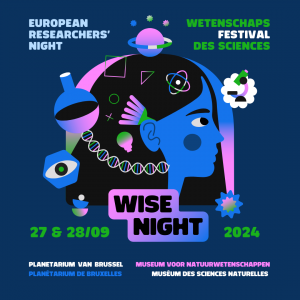WiseNight 2024 Festival at the Planetarium
The Planetarium of the Royal Observatory of Belgium participates in the free WiseNight Science Festival on 27 September 2024. WiseNight is a fun and inclusive event that aims to bring science and scientists in contact with the public interactively.
 WiseNight is part of the European Researchers’ Night, taking place everywhere in Europe simultaneously. The aim is to show that science is about passion, teamwork and for anyone with an insatiable curiosity to discover and change the world.
WiseNight is part of the European Researchers’ Night, taking place everywhere in Europe simultaneously. The aim is to show that science is about passion, teamwork and for anyone with an insatiable curiosity to discover and change the world.
In 2024, the WiseNight Festival will take place at two different places:
- On 27 September 2024 at the Planetarium of Brussels
- On 28 September 2024 at the Museum of Natural Sciences of Belgium
During these two days, the public will have the opportunity to learn new things about land, water and space research and to discover what being a (female/non-binary) scientist means in daily life.
The Planetarium of Brussels will host a variety of activities:
- Three planetarium movies sessions:
- ‘We are stars’ followed by a workshop ‘Create your own star chart’;
- ‘We are stars’ followed by a Q&A session with an astronomer;
- Earth’s Climate followed by a Q&A session with a meteorologist;
- Two activities related to space weather:
- ‘Panic in the Space Weather Room’: an interactive tour in the Space Weather office, where the space weather forecast is being prepared;
- Northern Lights: enjoy a spectacular show of the Northern lights, while listening to a local legend;
- Talks given by female scientists organised by Soapbox Science Brussels;
- Live sessions where you can interact with researchers who received a Marie Skłodowska-Curie Actions (MSCA) grant;
- An EU4U booth highlighting the European Union’s involvement in Research and Innovation,
- A portrait exhibition of scientists.
The festival is free of charge, but registration is required for practical purpose. For more information, visit the site www.wisenight.eu.
The WiseNight is organised by BeWiSe (Belgian Women in Science) with the participation of the Planetarium of the Royal Observatory of Belgium, the Museum of Natural Sciences of Belgium, the Von Karman Institute and the associations Ekoli and GoodPlanet Belgium. This project received funding from the European Union.

